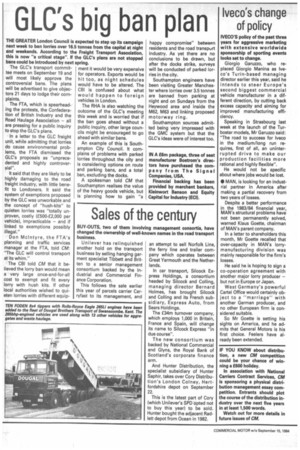GLC's big ban plan
Page 6

If you've noticed an error in this article please click here to report it so we can fix it.
THE GREATER London Council is expected to step up its campaign next week to ban lorries over 16.5 tonnes from the capital at night and weekends. According to the Freight Transport Association, this is now "a critical stage". If the GLC's plans are not stopped bans could be introduced by next spring.
The GLC's transport committee meets on September 19 and will most likely approve the controversial bans. The plans will be advertised to give objectors 21 days to lodge their complaints.
The FTA, which is spearheading the protests, the Confederation of British Industry and the Road Haulage Association — all are pressing for a public inquiry to stop the GLC's plans.
In a letter to the GLC freight unit, while admitting that lorries do cause environmental problems, the FTA dismissed the GLC's proposals as "unprecedented and highly controversial".
It said that they are likely to be highly damaging to the road freight industry, with little benefit to Londoners. It said the system of exemptions proposed by the GLC was unworkable and the concept of "hush-kits" to quieten lorries was "totally unproven, costly (£500-£2,000 per vehicle), impracticable — and if linked to exemptions possibly illegal."
Don McIntyre, the FTA's planning and traffic services manager at the FTA, told CM: "The GLC will control transport at its whim."
The CBI told CM that it believed the lorry ban would mean a very large once-and-for-all cost to exempt and fit every lorry with hush kits. If other local authorities wished to quieten lorries with different equip ment it would be very expensive for operators. Exports would be hit too, as night schedules would have to be altered. The CBI is confused about what would happen to foreign vehicles in London.
The RHA is also watching the outcome of the GLC's meeting this week and is worried that if the ban goes ahead without a public inquiry, other large councils might be encouraged to go ahead with similar bans.
An example of this is Southampton City Council. It complains of problems with parked lorries throughout the city and is considering options on route and parking bans, and a total ban, excluding the docks.
A spokesman told CM that Southampton realises the value of the heavy goods vehicle, but is planning how to gain "a happy compromise" between residents and the road transport industry. As yet there are no conclusions to be drawn, but after the docks strike, surveys will be conducted of parked lorries in the city.
Southampton engineers have been visiting Greater Manchester where lorries over 3.5 tonnes are banned from parking at night and on Sundays from the Heywood area and inside the M62, M63 and linking proposed motorway ring.
Southampton sources admitted being very impressed with the GMC system but that the GLC's ideas were of interest too.






























































































